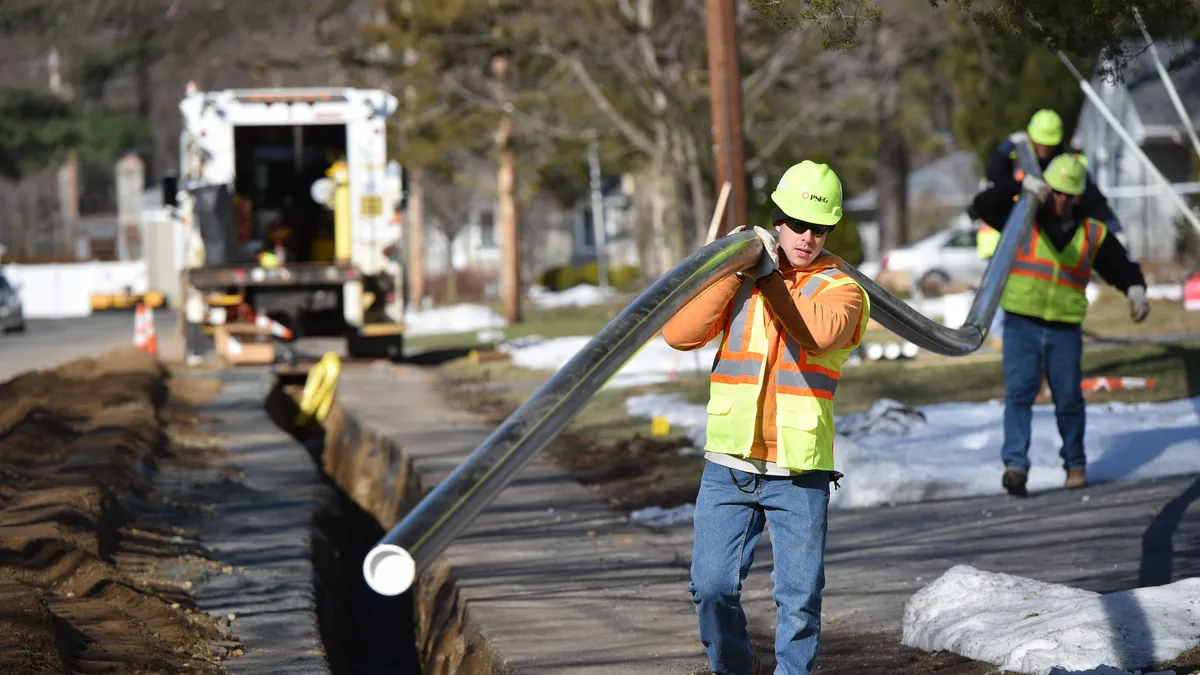Dive Brief:
- Massachusetts' natural gas distribution system had more than 34,000 leaks reported in 2017, including almost 7,500 "Class 1" leaks that were marked for immediate repair, according to an investigation by the Boston Herald.
- The Bay State's gas system has been under scrutiny since last fall, when a series of explosions in Northern Massachusetts killed one person and destroyed several homes. Accidental overpressurization on the Columbia Gas system is believed to be the cause.
- Restoration and recovery efforts in the Merrimack Valley are "now substantially complete," according to regulators, and the focus has turned to improving safety protocols and addressing leaks across the state's pipeline network.
Dive Insight:
Gas explosions last year focused on Massachusetts' aging infrastructure, even as the state worked to replace older pipelines that may no longer be safe. A review of state pipeline records completed by the Boston Herald revealed Massachusetts' gas distribution system had tens of thousands of leaks in 2017, with the most serious category of leaks, Grade 1, accounting for about 20% of the total.
And the issue is not confined to Massachusetts: The U.S. Department of Transportation (DOT) says more than half of gas pipelines in the United States were constructed in the 1950s and 1960s, meaning utilities across the nation are taking a hard look at the reliability of their own systems.
According to the DOT, cast and wrought iron pipelines are "among the oldest energy pipelines constructed in the United States." Many are six decades or older and still deliver gas to homes and businesses. A 2011 law calls for for the DOT to conduct a state-by-state survey on the progress of cast iron pipeline replacements.
Of the three grades of gas leaks in Massachusetts, Grade 1 represents the most serious and requires repair as soon as possible. Grade 2 is considered non-hazardous, but will require repair — the state had about 6,400 of these in 2017. The most minor leak, Grade 3, is non-hazardous and is likely to remain in that condition — the Herald's analysis found about 20,500 of these minor leaks.
"We're literally sitting on bombs," Audrey Schulman, executive director of Cambridge-based Home Energy Efficiency Team (HEET), told the Herald. She said the only place with gas infrastructure older than Massachusetts is Baltimore.
Baltimore Gas & Electric spokesman Richard Yost said the utility is committed to safe delivery of energy, and has been upgrading and replacing portions of its system under its Strategic Infrastructure Development and Enhancement gas system modernization plan.
"We follow all industry standards ... conducting regular inspections of our system, performing preventive maintenance, and installing or renewing natural gas lines as needed. In addition, we have several mechanical and procedural safety precautions in place to protect against potential issues," Yost told Utility Dive via email.
Last year, BGE invested approximately $600 million in equipment inspections, repairs and replacements, preventive maintenance, and reinforcement projects. The utility is also replacing existing gas mains with durable new pipes, Yost wrote.
In Massachusetts, HEET's work helps customers save on energy bills, and maps gas leaks in in the state. According to the non-profit, two years ago, research showed that a small portion of gas leaks (about 7%) emit half of all gas lost across the system.
Massachusetts has been focused on reviewing and improving its gas system since the September 2018 explosions. In December, the Department of Public Utilities (DPU) ordered Columbia Gas to enter into an agreement with Massachusetts-based Nitsch Engineering to monitor the company's management of the remaining restoration and recovery work in Merrimack Valley.
The DPU has also directed National Grid to implement "comprehensive new safety protocols" before the company can initiate any natural gas work besides emergency work. Regulators put work restrictions on National Grid after an overpressurization incident in Woburn, Massachusetts, which did not lead to any major disruptions.
According to HEET, Massachusetts gas utilities are replacing about 200 miles of gas pipeline each year.
Addressing the Merrimack Valley explosions, Columbia Gas last year replaced nearly 44 miles of gas main lines throughout three impacted communities, and installed over 5,000 service lines.















